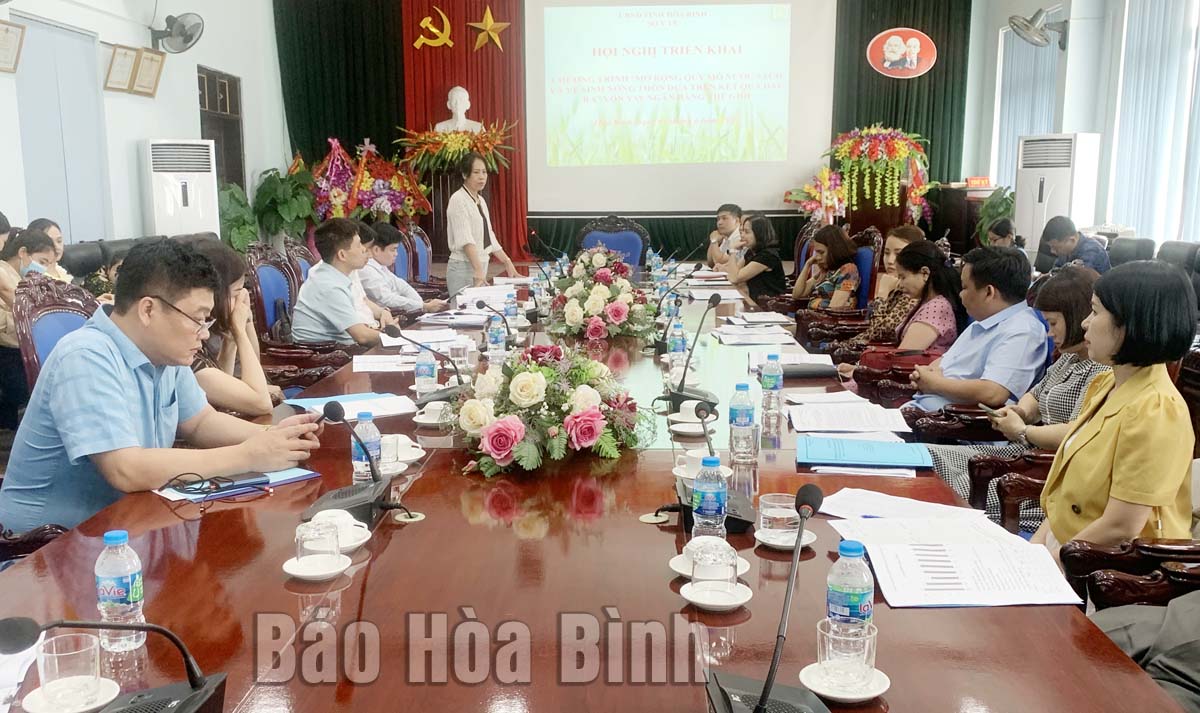
(HBO) - In the afternoon of June 3, the Department of Health held a conference to implement the program "Expanding the scale of the rural clean water and sanitation based on the output” with the loans from the World Bank.

The delegates are discussing at
the conference.
The program is implemented in 21
provinces in the Northern mountainous region, the Central Highlands and the
Southern Central region, including Hoa Binh province. The programm was
conducted in the period of 2016 - 2020, however, it has been allowed to last
until the end of December 2022 by the Governemnt due to the impact of Covid-19
pandemics. The program focuses on providing the communication activities to
change the behavior, developing the sanitation market and building the
infrastructure to support the behavior change, support the sustainable service
development and build the institutional capacity for the service delivery. In
Hoa Binh province, the program has been implemented since 2018, with the goal
of 60 communes achieving the commune-wide sanitation, 30 communes achieving the
sustainable commune-wide sanitation, 85 water works and communal health
stations' latrines being renovated and newly built. Up btill now, 85 water
works and the medical sanitary latrines have been built and renovated; 32 out
of the 60 communes have achieved the commune-wide sanitation, 11 out of the 30
communes have achieved the sustainable commune-wide sanitation.
The conference has focused on
discussing and analyzing the difficulties and obstacles in the actual
implementation process in the locality, especially in the remote and
mountainous communes and areas with difficult economic conditions in Kim Boi,
Da Bac, Cao Phong districts, which have the low rate of hygienic latrines for
the households. Thereby, it has been contributing to the completion of the plan
and roadmap so that all households have and use the hygienic latrines by 2030
according to the Government's commitment to the international community.
More than just an information technology teacher, Bui Van Nien is an inspiring figure who has nurtured the scientific curiosity and creative spirit of students in Vietnam’s ethnic minority communities.
Da Bac is the most disadvantaged mountainous district in Hoa Binh province, with ethnic minorities accounting for about 90% of its population. Over the past years, the district has mobilised resources to implement ethnic policies to improve the quality of life of local people.
In recent years, Hoa Binh province has consistently prioritised the protection, care, and education of children, particularly those from ethnic minorities and disadvantaged backgrounds, by creating a safe, healthy, and nurturing environment for their all-round development.
The Steering Committee for Tobacco Harm Prevention and Control of Hoa Binh province, in coordination with the Tobacco Harm Prevention and Control Fund, held a ceremony on May 28 in response to the World No Tobacco Day (May 31) and the National No Tobacco Week (from May 25 to 31). The event was chaired by Nguyen Van Toan, Standing Vice Chairman of the provincial People’s Committee and head of the Steering Committee.
Since 2021, the Center for Industrial Promotion and Industrial Development Consulting (CIIDC) under the Department of Industry and Trade has been implementing a school lighting model as part of the plan for using energy efficiently and economically in Hoa Binh Province in the pẻiod of 2021 - 2025. This model not only aims to improve the learning conditions and enhance the education quality, but it also promotes the message of energy saving, energy security, environmental protection and contributes to the goals of socio-economic development.
In the 2024 - 2025 school year, the entire Hoa Binh provincial education sector includes 520 educational institutions and schools. Among them are 13 ethnic boarding schools with 153 classes and 4,487 students. Four of these schools have met national standards, reaching 30.7 percent.



